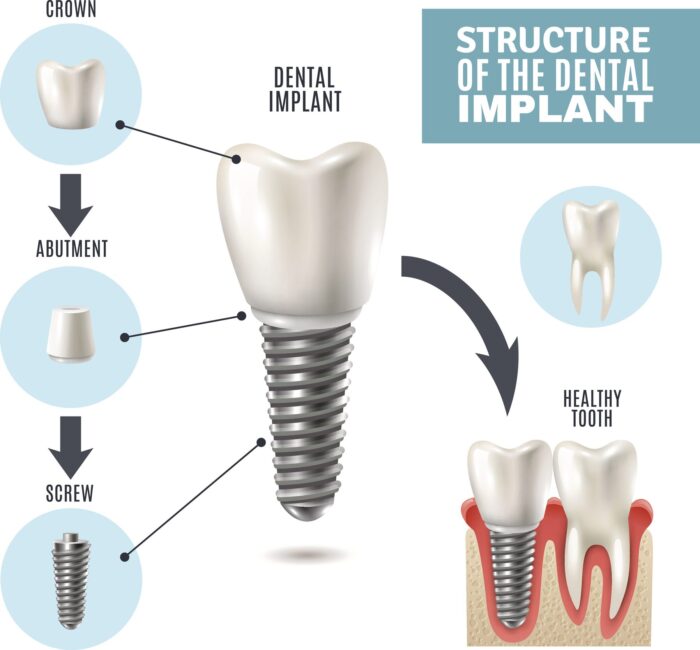Things about Dental Sense
Things about Dental Sense
Blog Article
Some Known Details About Dental Sense
Table of ContentsEverything about Dental SenseNot known Details About Dental Sense 10 Simple Techniques For Dental SenseWhat Does Dental Sense Do?
are clinical gadgets surgically implanted into the jaw to restore an individual's capacity to eat or their look. They provide assistance for man-made (fake) teeth, such as crowns, bridges, or dentures. When a tooth is lost due to injury or illness, a person can experience complications such as quick bone loss, malfunctioning speech, or adjustments to eating patterns that lead to pain.Oral implant systems include an oral implant body and dental implant joint and might also include an abutment fixation screw. Dental implants. The dental implant body is operatively placed in the jawbone instead of the tooth's root. The oral implant abutment is generally connected to the dental implant body by the abutment addiction screw and extends through gums into the mouth to sustain the connected man-made teeth
(https://www.twitch.tv/dentalsense1/about)Framework of The Oral Implant System choosing oral implants, speak to your dental supplier regarding the possible benefits and risks, and whether you are a candidate for the treatment. Things to think about: Your overall wellness is a crucial element in identifying whether you are a great candidate for oral implants, exactly how long it will certainly take to heal, and for how long the dental implant may stay in area.
Smoking may impact the healing process and decrease the long-lasting success of the dental implant. The recovery process for the dental implant body may take a number of months or longer, during which time you usually have a short-lived abutment instead of the tooth. the oral implant procedure: Very carefully follow the oral hygiene directions offered to you by your dental company.
Getting My Dental Sense To Work
Implant failing can lead to the demand for one more procedure to deal with or replace the dental implant system. Restores the capacity to chew Brings back aesthetic appearance Helps maintain the jawbone from reducing as a result of bone loss Protects the health of the surrounding bone and gum tissues Aids keep nearby (neighboring) teeth steady Boosts lifestyle Damages to surrounding all-natural teeth during dental implant positioning Injury to the surrounding cells throughout surgical procedure, such as sinus perforation Injury throughout surgical procedure (as an example, fracture of surrounding jawbone) Inadequate feature, such as really feeling like the teeth do not bite with each other typically An experience that the tooth is loosened or turning in place arising from an abutment screw loosening up Implant body failure (looseness of the implant body) as a result of systemic infection, which might be most likely in clients with unrestrained diabetes due to regional infection in bone and gum tissues supporting the dental implant body because of delayed healing, which might be more his comment is here probable in individuals who smoke Trouble cleaning the gum tissues around the dental implant, leading to poor dental health Untreated periodontal disease Post-surgical feeling numb because of nerve impingement or damages Constantly notify health and wellness treatment service providers and imaging professionals that you have oral implants before any kind of magnetic resonance imaging (MRI) or x-ray procedures.
FDA is not familiar with any adverse events reported for MRI or x-ray treatments with oral implants. Oral implants systems are commonly made of products that comply with worldwide consensus criteria of the International Company for Standardization (ISO) or ASTM International. These requirements have details of what makes a risk-free product.

An oral implant is a framework that changes a missing out on tooth. With screw-like devices, the cosmetic surgeon inserts a dental implant into the jawbone, and it acts as an anchor for a fabricated tooth, called a crown.
Not known Incorrect Statements About Dental Sense
Some individuals are not qualified for oral implant surgical procedure. It is for oral cosmetic surgeons to operate on people with: intense illnessuncontrollable metabolic diseasebone or soft cells condition or infectionIf these issues are fixed, a person can have the surgical treatment. In, oral surgeons abstain from operating individuals with: If individuals with any one of the above go through oral implant surgical procedure, there is a greater risk of the dental implant falling short.

Dental implant surgery is a tailored process. It's not the very same for everyone. Yet the adhering to provides a basic introduction of what you can expect your dental professional, dental doctor, periodontist or prosthodontist to do: Position the dental implant operatively. Give you time to heal. Connect the post and final crown, bridge or denture.
Next off, your surgeon will thoroughly position the dental implant into your jaw. Your specialist will rearrange your gum tissues and shut the cut with stitches. If your implant is near the front of your mouth, your dental professional will make a momentary tooth for you to use up until you recover. By doing this, you will not have a space in your smile while you recoup.
Getting The Dental Sense To Work
Throughout the recovery stage, your jawbone needs to fuse to the oral implant. This procedure can take anywhere from 3 to nine months.
Once your dental implant heals, your dental expert can connect the joint (small adapter blog post) and your final remediation (crown, bridge or denture). This usually takes concerning one hour to finish and might call for a second small surgery. You shouldn't feel any type of pain during your oral implant treatment because your company will make use of medicine to numb your gums.
Report this page